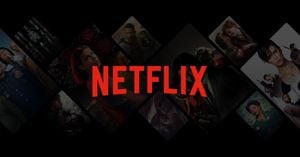The long-awaited release of Gladiator II has finally hit theaters, and excitement abounds among fans eager to see how the story unfurls this time. Reviving the spirit of the acclaimed original film, Ridley Scott returns to the director's chair, promising larger-than-life spectacles alongside gripping narratives. The film has generated significant buzz, aided by its star-studded cast, including Denzel Washington and rising star Paul Mescal.
Critics have been buzzing about Gladiator II, noting how the film both honors and contrasts with the original. Denzel Washington takes on the role of Macrinus, previously portrayed by Russell Crowe as Maximus. Mascal's character, Lucius Verus, is the son of Maximus and hence carries the burden of his father's legacy as he navigates not only his family's history but also the tumultuous political climate of Rome.
While many reviewers have praised the film's visual flair and the intensity of its battles, they have simultaneously pointed out some narrative shortcomings. Jeremy Konrad from Bleeding Cool expresses mixed sentiments, pointing out the action sequences shine with Scott's signature grit and grandeur. “Gladiator II is entertaining but does not quite match the heights of its predecessor,” he notes. Critics mostly agree; it justifies its existence, but some felt more could have been done to break fresh ground.
One of the standout elements has certainly been the action sequences, which Scott demonstrates as skillfully as ever. The film features grand arena scenes, capturing both the majesty and the chaos of gladiatorial clashes. Konrad captures the essence with high praise, describing the fight scenes as “gorgeous, brutal, and even heartbreaking.” Indeed, one cannot help but appreciate the adaptation of state-of-the-art CGI and practical effects to make the spectacle even more immersive.
Despite its entertaining approach, some viewers have highlighted the formulaic elements of the plot. Critics like Charlotte Higgins from The Guardian have pointed out the film often indulges itself too prominently in historical license, with unrealistic details possibly undermining what could have been more compelling storytelling. For example, the portrayal of the Colosseum’s water battles sparked debate, with Higgins and others pointing out the scenes where combatants ride on the backs of rhinos stretch believability to its limits.
Speaking of historical accuracy, Ridley Scott has previously faced criticism for the handling of facts within his films. Several historical experts have weighed in, discussing the legitimacy of depicting various events and elements within the film. One such debate surrounds the celebrated naval battles of the Colosseum, which Scott staunchly defends, insisting they occurred during the grand inauguration by Emperor Titus back in 80 AD. “You’re dead wrong,” he retorted to critics about the accuracy displayed within the narrative, showcasing his commitment to creating vivid, albeit dramatized retellings of history.
Regardless of the mix of ratings and reviews, Gladiator II undoubtedly continues to thrive at the box office, signaling its powerful draw among the audience. Its release has inspired broad discussions around film critiques, historical portrayal, and the legacy of the original Gladiator. Cultivated interest is skyrocketing, with many eagerly anticipating potential sequels or ties to the past cinematic masterpiece.
Even outside of the film’s cinematic experience, its premiere made waves with notable attendance from various industry figures, including King Charles III, who made his entrance alongside Paul Mescal and Denzel Washington at the London event. Mescal's honest reflections about the meeting alluded to the cultural intersection between Hollywood glam and royal tradition. “I’m Irish, so it’s not on the list of priorities,” he said, reflecting casual humility yet hints of pride surging underneath.
Meanwhile, Deseret News discusses how the film appeals to teen audiences drawn not just by its intense narratives, but by its modern-day star power. With the intense levels of violence and gore, the film has drawn the attention of critics and parents alike who are left to question the accessibility of such content for younger audiences. This backdrop of controversy adds another layer to the film’s cultural conversation, as parents grapple with the decision of whether to introduce their children to this cinematic interpretation of ancient Rome.
Indeed, if one thing is clear, it’s the dialogue surrounding Gladiator II serves as merely the tip of the iceberg. With the convergence of modern film making and traditional storytelling, audiences are bound to have varying thoughts, opinions, and experiences when it hits screens across theaters. It seems like the battle over Gladiator II is just as spirited as those depicted within its own frames.
For those interested to immerse fully within this experience, the wait is over as Gladiator II officially lands on cinema screens—offering both spectacle and nostalgia for fans of the 2000 classic. Can it reclaim the legacy or will it fumble the artifacts of cinematic history? Only time will tell, as audiences rally around this anticipated sequel and join in the (often pointed) conversations it spurs.



